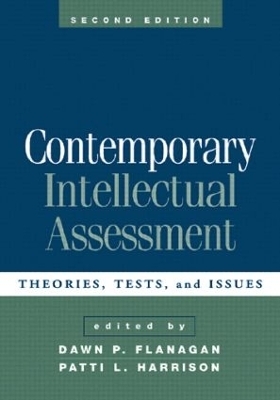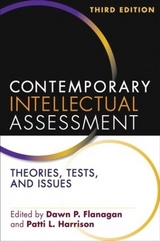
Contemporary Intellectual Assessment, Second Edition
Guilford Publications (Verlag)
978-1-59385-125-5 (ISBN)
- Titel erscheint in neuer Auflage
- Artikel merken
Dawn P. Flanagan, PhD, is Professor of Psychology at St. John's University in New York. She writes and conducts research on such topics as the structure of intelligence, psychoeducational assessment, learning disabilities evaluation and diagnosis, and professional issues in school psychology. Dr. Flanagan's articles and chapters on these topics appear in school and clinical psychology journals and books. She is senior author of The Wechsler Intelligence Scales and Gf-Gc Theory: A Contemporary Approach to Interpretation, Essentials of Cross-Battery Assessment, The Achievement Test Desk Reference (ATDR): Comprehensive Assessment of Learning Disabilities, Diagnosing Learning Disability in Adulthood, and Essentials of WISC-IV Assessment; coauthor of The Intelligence Test Desk Reference (ITDR): Gf-Gc Cross-Battery Assessment and Essentials of WJ III Cognitive Assessment; and coeditor of Clinical Use and Interpretation of the WJ III. Dr. Flanagan is a Fellow of the American Psychological Association and Diplomate of the American Board of Psychological Specialties, as well as a past recipient of the APA's Lightner Whitmer Award. Patti L. Harrison, PhD, is Professor in the School Psychology Program and Associate Dean of the Graduate School at the University of Alabama. She has conducted research on intelligence, adaptive behavior, and preschool assessment. Dr. Harrison's articles and chapters on assessment topics appear in school and clinical psychology and special education journals and texts, and she has presented over 100 refereed and invited presentations on these topics at conferences of professional organizations in psychology and education. She was Editor of School Psychology Review and has been an editorial board member for several school psychology and related journals, including School Psychology Quarterly, the Journal of School Psychology, the Journal of Psychoeducational Assessment, the American Journal on Mental Retardation, and Diagnostique.
Part I: The Origins of Intellectual Assessment. Wasserman, Tulsky, The History of Intelligence Testing. Kamphaus, Pierce Winsor, Rowe, Kim, History of Intelligence Test Interpretation. Part II: Contemporary and Emerging Theoretical Perspectives. Horn, Blankson, Foundations for Better Understanding of Cognitive Abilities. Carroll, The Three-Stratum Theory of Cognitive Abilities. Chen, Gardner, Assessment Based on Multiple-Intelligences Theory. Sternberg, The Triarchic Theory of Successful Intelligence. Naglieri, Das, Planning, Attention, Simultaneous, Successive Theory: A Revision of the Concept of Intelligence. McGrew, The Cattell-Horn-Carroll Theory of Cognitive Abilities: Past, Present, and Future. Part III: Contemporary and Emerging Interpretive Approaches. Alfonso, Flanagan, Radwan,The Impact of the Cattell-Horn-Carroll Theory on Test Development and Interpretation of Cognitive and Academic Abilities. Floyd, Information-Processing Approaches to Interpretation of Contemporary Intellectual Assessment Instruments. Ortiz, Ochoa, Advances in Cognitive Assessment of Culturally and Linguistically Diverse Individuals: A Nondiscriminatory Interpretive Approach. Watkins, Glutting, Youngstrom, Issues in Subtest Profile Analysis. Mather, Wendling, Linking Cognitive Assessment Results to Academic Interventions for Students with Learning Disabilities. Part IV: New and Revised Intelligence Batteries. Zhu, Weiss, The Wechsler Scales. Roid, Pomplun, Interpreting the Stanford-Binet Intelligence Scales, Fifth Edition. Kaufman, Kaufman, Kaufman-Singer, Kaufman, The Kaufman Assessment Battery for Children-Second Edition and the Kaufman Adolescent and Adult Intelligence Test. Schrank, The Woodcock-Johnson III Tests of Cognitive Ability. Elliott, The Differential Ability Scales. McCallum, Bracken, The Universal Nonverbal Intelligence Test: A Multidimensional Measure of Intelligence. Naglieri, The Cognitive Assessment System. Reynolds, Kamphaus, Introduction to the Reynolds Intellectual Assessment Scales and the Reynolds Intellectual Screening Test. Part V: Use of Intelligence Tests in Different Populations. Ford, Dahinten, The Use of Intelligence Tests in the Assessment of Preschoolers. McIntosh, Dixon, Use of Intelligence Tests in the Identification of Giftedness. Mascolo, Flanagan, Psychoeducational Assessment and Learning Disability Diagnosis. Ortiz, Dynda, The Use of Intelligence Tests with Culturally and Linguistically Diverse Populations. Braden, Athanasiou, A Comparative Review of Nonverbal Measures of Intelligence. Part VI: Emerging Issues and New Directions in Intellectual Assessment. Keith, Using Confirmatory Factor Analysis to Aid in Understanding the Constructs Measured by Intelligence Tests. Braden, Niebling, Using the Joint Test Standards to Evaluate the Validity Evidence for Intelligence Tests. Brown-Chidsey, Intelligence Tests in an Era of Standards-Based Educational Reform.
| Erscheint lt. Verlag | 25.4.2005 |
|---|---|
| Verlagsort | New York |
| Sprache | englisch |
| Maße | 178 x 254 mm |
| Gewicht | 1334 g |
| Themenwelt | Geisteswissenschaften ► Psychologie ► Allgemeine Psychologie |
| ISBN-10 | 1-59385-125-1 / 1593851251 |
| ISBN-13 | 978-1-59385-125-5 / 9781593851255 |
| Zustand | Neuware |
| Haben Sie eine Frage zum Produkt? |
aus dem Bereich



